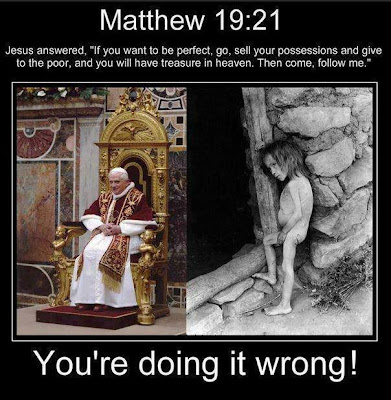I should preface this article by saying, I do not propose that only Christianity is man-made; I believe all religions are the product of man, but I happen to be raised in a Christian upbringing, and so this is my forte. After a year-long analysis of my faith and doctrine, one of the conclusions that I finally made (with the help of Hitchens and Dawkins), is that god did not create man, but man created god.
What kind of problems? Hatred and violence would be one of many.
This idea is not new; in fact there are numerous philosophers that surmised just as much, using only reasoning and observation to come to this conclusion. This here is my my personal "top five" reasons that I think concisely and irrevocably illustrates my justifications for saying that religion, or Christianity in particular is man-made.
5. The Biblical Creation Account
Let's review what we know about the Genesis creation story:
Day 1: God created the heaven (his territory, I presume) and the earth (the planet earth. With waters on its surface) and spoke light into existence. Evenings and mornings were created.
Day 2: God made the atmosphere. A notable feature of this atmosphere is the firmament, a cosmic divider which separated the waters from the waters.
Day 3: God told the water to move back, so that dry land may appear. From there, he made the whole of the plant kingdom.
Day 4: God made the sun, moon, stars, and every celestial body in the universe. And where did he put these things? In the firmament.
Day 5: God made sea and air animals, and he granted them permission to perform intercourse as they please.
Day 6: God made land animals, and he granted them permission to perform intercourse as they please. Oh, and he also made Adam and Eve. In his own image.
Day 7: It's finished. And god, the all-powerful deity who spoke the universe into existence, rested.
In a nutshell.
Do you notice something in this story? Does this seem realistic? Does this accurately represent the universe as we see it? No, of course not. Many will argue that Genesis isn't to be taken literally, but figuratively. But many of these Christians don't realize that that's just their opinion. They don't know that there are people who are so close-minded in scientific evidence and so firm on their faith in the Bible, that they chose to take every letter of the Creation story literally. All of it.
This is a destructive view. It is a slap in the face of science, history, archaelogy, and reality, to have people teach this story as factual. In fact, it is quite evident that the structure of the Genesis creation account is very akin to a mythical story-telling perspective. Furthermore, there's no definitive agreement as to who really wrote the first five books of the Bible.
Clearly, this is a man-made story meant to be told only at Bronze Age eras, nothing more. If the beginning of your book is man-made, isn't that enough basis to suspect that the religion formed around this book is also man-made?
4. Original Sin
And God said, "I hereby declare that the
sins of the parent shall be passed on to all of the generations of their
children! Oh and by the way, they need my son to be saved. From myself."
Sound familiar?
An all-powerful, all-knowing, all-good god made this decree
himself; no interpretations, no wordplays, just pure, objective look at the
bible verses. This unreasonable decree ensures that the people will beg-- yes, beg redemption and salvation from their curser. Yes, curser. Still not clear to
you? God cursed all of humanity, then he demanded that we cure ourselves using his son. Neat, huh?
A nice business strategy includes giving the people the
sickness, then selling out the cure. The Christian religion is a man-made
business, and it's saddening that people just take this horrible concept like
it's normal, and a good thing. Is punishing the children for the sins of the
parent normal? Is it morally good to pass on the crimes of the parent to their
innocent offsprings? If it's not, then God clearly is immoral.
3. "Man"-made religion
Yes,
man-made. Not woman-made. The Christian religion was designed with a
patriarchal dominance in mind. God was referred to as a "He". Eve was
the first one tempted. Eve ate the fruit first. Many verses portray women as
inferior, submissive, unimportant, and spoils of war. The more you read the bible, the more apparent it is that gender equality is certainly out of the
equation here. Actually, the three Abrahamic religions have this in common: they portray women as inferiors!
I wonder what Christian women do with these verses. Cherry-pick them out, perhaps?
In the Old Testament, only men were recorded in genealogies. Men
were always the head or leader. Men were allowed to have several women. Women
were supposed to shut up and let the men do all the decisions. Women had
constrained rights. In the New Testament, all of Jesus' disciples were male.
Jesus said that the church was to be headed by Peter. The whole of Vatican is
today controlled by men! In fact, the entire Christian powerhouse is dominated
by men.
The Christian religion is a patriarchal corporation. Any Christian woman who wishes to have equal rights with men must first ask themselves, "What am I doing in a religion which seeks to promote my inferiority?"
2. The Bible and God
Inaccurate
and inherently contradictory, this "divine book" was clearly authored
by imperfect men. Let's take a look at Yahweh, the almighty bearded man in the
heavens. As a start, this is not original. Ever heard of Zeus and Odin?
What is it about beards that makes these deities superior?
Next,
why would an all-knowing, all-present god have to ask "where are you?" Why would
an all-knowing god have regret? Why would an all-knowing god have to
"remember" things? Why would a perfect god have jealousy? Why would a
perfect god demand worship or sacrifice? Why would a perfect and all-good god keep anger forever? Why would an all-powerful god have incapabilities? Why would an
all-powerful god have weaknesses? Why would an all-powerful god need to wait
for some time to defeat an evil that shouldn't have existed in the first place?
It's all part of their business strategy.
Do you see that these attributes are clearly human-like? A God with god-like
powers but human-like imperfections, can only exist in one place: In the minds
of men.
1. The Vatican
One
look at the glittering corridors of St. Peter's Basilica can immediately help
us draw to a single conclusion: This is a man-made, patriarchal business
corporation, and the whole of Vatican is their profit. Ever wondered why almost
no believer can abide by this bible verse?
The biggest sect of all of
christianity has all the luxury, all the benefits, all the resources, and they
can't do this one simple piece of advice that their deity had said in their
holy book. Why? Of course, they wont! Because you can't do business if
you give away all of your earnings! The corporation would collapse in an
instant!
You would think that they should be confident about that NOT
happening, because they believe they had god on their side, but no no. They
would rather stick to their money and gold and play it safe behind their walls, than to
give all of it away to the less fortunate, and pray that their god somehow
replenish their supply.
Does this show faith? Does this show unconditional charity? Does this show the ultimate goodness that their deity had been proclaiming?
Does this show faith? Does this show unconditional charity? Does this show the ultimate goodness that their deity had been proclaiming?
Of course not. Because their deity is man-made, and their
corporation is hanging on a slim hope that their people would not discover the
true structure of their controlling agenda.





































